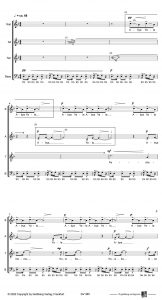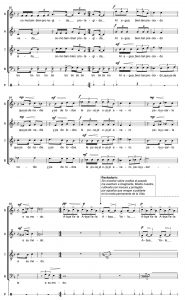Virginia Bono, Choral Director
 A composition competition is one space, among others, that can generate a repertoire. Voces de Latinoamérica, following the model of Our voice for our planet, sought to inspire choral creators to think of music as a vehicle for communicating an ecological message that would promote awareness of environmental problems, value for the earth as a generator of life, and that would be linked to the most ancestral ideas, like the original communities of the American continent and modern ideas about sustainability. In this way it is a great contribution for choirs who want to present certain paradigms for the construction of human values in concordance with nature with their voices.
A composition competition is one space, among others, that can generate a repertoire. Voces de Latinoamérica, following the model of Our voice for our planet, sought to inspire choral creators to think of music as a vehicle for communicating an ecological message that would promote awareness of environmental problems, value for the earth as a generator of life, and that would be linked to the most ancestral ideas, like the original communities of the American continent and modern ideas about sustainability. In this way it is a great contribution for choirs who want to present certain paradigms for the construction of human values in concordance with nature with their voices.
The announcement was applauded by the Latin American choral community, and numerous winning works were received from various countries across the continent:
- 1st prize: Reflexión. Music: Pablo Roberto. Text: Eduardo “Lalo” Aibar
- 2nd prize Canta la tierra. Music and text: Alfonso Paz Demasi
- Honorable Mention: Madre tierra: somos uno. Music and text: Javier Donetti
This contest rewarded the winning works with publication by the Goldberg Verlag publishing house in Frankfurt, Germany (www.goldberg-verlag.com). This concrete opportunity for publication makes the work accessible to all choirs and directors who may be interested and supports spreading the work with all the formalities necessary to preserve the rights of the creators. In Latin America circulation of scores tends to be more usually internal due to the scarcity of musical publishers, so this product elevates the value of choral work and its authors.
A marvelous addition to the Voces de Latinoamérica project is the worldwide premier of the first prize winning work, Reflexión, in the context of a very special event. In cooperation with the choral contest and festival in the city of San Carlos de Bariloche (Argentina), it will be presented for the first time in the presence of the composer, local and national authorities from various countries, and sung by the participating choirs. The event, called “Plant and Sing”, consists of a mass planting of 300 native trees on Victoria Island in the Nahuel Huapi National Park on Saturday, October 29. This is part of a reforestation initiative for Patagonian forests, which have suffered so much fire damage. This will kick off an informational talk about caring for the environment, reducing personal and group carbon footprint, and planting the trees as mentioned. It will culminate in the choral piece Reflexión sign by all the attendees, thereby marking the musical presence in this ecologically important action.
A brief overview of Reflexión, by Argentinian composer Pablo Roberto, first prize winner in the Choral Compositions on ecological themes competition
The composition brings together elements characteristic of different areas in Latin America. Some of these are musical elements, like the ostinato for the bass voices in loncomeo rhythm, which comes from the Tehuelche-Mapuche culture in Patagonia, in the far south of the continent. Others are in the text, like Abya Yala, a term in the Dulegaya language from the Kuna ethnic group in northern Colombia and Panama, or Pachamama, a Quechua word that means mother earth and is recognized throughout the Andean region and South America. In this way the piece brings together the whole continent into one reflection on the value of the earth, care and hope for a future time with more protection and respect for it. It is the song of an entire race, diverse and plural, that honors mother earth, laments the bad things that have occurred, and augurs for a time to come when there will be a balance between humanity and nature. This symbol is reinforced by the use of the term Abya Yala, which means living Earth, flourishing Earth, but has come to be a term that signifies identity and unity for the indigenous peoples of Latin America.
The presence of rhythmic-melodic ostinatos in all the voices creates a ceremonial, dance-like atmosphere. The writing gives detailed specifications for articulations and glissandi between notes as well as on the end of a long note, allowing for the characterization necessary for an interpretation that imitates the sound of the kultrún (mapuche drum) in the basses, and the various acclamations for mother earth with a lightly nasal sound, in the rest of the voices. As at the beginning of the piece, sounds of birds and wind come in from time to time, completing the sonic landscape.
At three points a recitation is added to the musical line, which is worth translating to the language of the choir and the audience so that the message has even more communicative value.
Pacha Mama, Mother Earth
Kusilla, Kusilla, in Abya Yala
And throughout,
With different names, Languages and Cultures.
I greet you.Without dreaming of returning to the past
I venture to imagine you, our Mother,
Cultivated carefully and protected
By those who have come to populate you
In the eternal cycle of Life.
Combined with the ostinatos, the melody is developed in the interwoven voices of the choir, and at the most intense moment the choral texture becomes almost homorhythmic along with a noticeable increase in harmonic richness that accents the strength of the message.
This 4 minute piece written for mixed choir without divisi is would be a great addition to any choir’s repertoire. Perhaps the parts of the text in Spanish could pose a difficulty for those who don’t speak it, but this can easily be overcome. The phrases in Quechua and Dulegaya are short and repetitive and don’t represent a pronunciation challenge.
The musical contribution is important because it includes rhythms and melodic turns specific to the ethnic and folkloric music of Latin America authentically and accessibly for choirs from all over.
From the southern part of the Latin American continent I invite you to make it your own and add it to your repertoire, as well as to make its message of love for our Earth your own and become messengers with out voices, our choirs, of a consciousness that is more in harmony with nature.
Translated by Taylor Ffitch, USA



